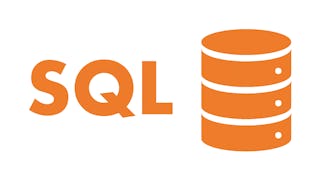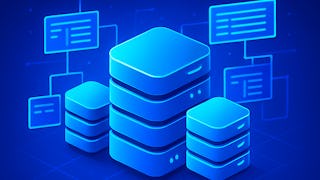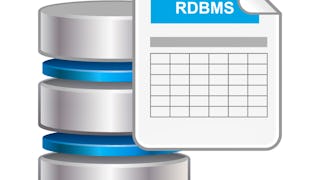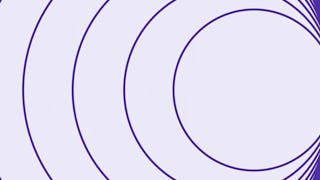Les systèmes de gestion de base de données sont un élément essentiel de la plupart des systèmes industriels à grande échelle et des systèmes open-source. Ce cours vous présentera les concepts importants des systèmes de base de données et de leur conception. Nous apprendrons ce que sont les bases de données relationnelles, à quoi elles servent, la théorie qui sous-tend leur conception, et comment interroger et modifier une base de données en utilisant le langage déclaratif SQL.

Profitez d'une croissance illimitée avec un an de Coursera Plus pour 199 $ (régulièrement 399 $). Économisez maintenant.

Introduction aux bases de données relationnelles
Ce cours fait partie de plusieurs programmes.


Instructeurs : Gerald Balekaki
3 531 déjà inscrits
Inclus avec
(32 avis)
Expérience recommandée
Ce que vous apprendrez
Décrire ce que sont les bases de données relationnelles et comment elles sont utilisées.
Maîtriser le modèle de base de données relationnelle.
Démontrer des compétences complètes en SQL.
Compétences que vous acquerrez
- Catégorie : Gestion des bases de données
- Catégorie : Conception de la base de données
- Catégorie : Comptes d'utilisateurs
- Catégorie : Architecture et administration des bases de données
- Catégorie : Manipulation de données
- Catégorie : Langage de requête
- Catégorie : Bases de données
- Catégorie : Systèmes de gestion de bases de données
- Catégorie : SQL
- Catégorie : Accès aux données
- Catégorie : Théorie des bases de données
- Catégorie : Bases de données relationnelles
- Catégorie : Systèmes de base de données
- Catégorie : Modélisation des données
Détails à connaître

Ajouter à votre profil LinkedIn
21 devoirs
Découvrez comment les employés des entreprises prestigieuses maîtrisent des compétences recherchées

Élaborez votre expertise du sujet
- Apprenez de nouveaux concepts auprès d'experts du secteur
- Acquérez une compréhension de base d'un sujet ou d'un outil
- Développez des compétences professionnelles avec des projets pratiques
- Obtenez un certificat professionnel partageable

Il y a 4 modules dans ce cours
Bienvenue dans le cours Introduction aux bases de données relationnelles ! Dans ce cours, nous aborderons les sujets suivants : Vue d'ensemble des bases de données, algèbre relationnelle, SQL. Ce module d'apprentissage fournit une introduction complète aux bases de données relationnelles, à leurs applications et à leurs composants. En commençant par une introduction aux bases de données et à leurs diverses applications, le module aborde les composants des schémas de bases de données relationnelles, y compris les relations, les attributs et les clés. Les étudiants apprendront à concevoir des schémas de base de données simples et à comprendre les concepts clés des bases de données tels que les enregistrements, la récupération et la modification des données, et les clés primaires/étrangères. Le module inclut des exemples du monde réel pour une compréhension pratique.
Inclus
7 vidéos9 lectures6 devoirs1 sujet de discussion
Ce module d'apprentissage explore les concepts et opérations fondamentaux de l'algèbre relationnelle, la base théorique des bases de données relationnelles. Il introduit les concepts de base de l'algèbre relationnelle tels que "relation", "tuple" et "opération", puis se plonge dans les opérations fondamentales de l'algèbre relationnelle, notamment la sélection, la projection et l'union. Les étudiants se familiariseront également avec des opérations plus avancées telles que les jointures et les divisions, élargissant ainsi leur compréhension de la manière dont les relations de données complexes peuvent être gérées. En outre, le module couvre les opérations composites et d'agrégation pour gérer des manipulations de données plus complexes, ainsi que les opérations de modification des relations. Ce module donne aux étudiants une base théorique solide pour travailler avec des bases de données relationnelles.
Inclus
7 vidéos5 lectures6 devoirs
Ce module d'apprentissage permet de comprendre en profondeur le langage SQL (Structured Query Language), le langage standard utilisé pour gérer les bases de données relationnelles. En commençant par les principes de base, les étudiants apprendront à utiliser les opérations SELECT et set pour extraire des informations pertinentes des tables de la base de données. Le module passe ensuite à des requêtes plus complexes impliquant des jointures, permettant aux étudiants de localiser et d'amalgamer des informations provenant de plusieurs tables de base de données. Il aborde ensuite la modification des tables de base de données, la définition de leurs structures, la création de contraintes d'intégrité référentielle pour maintenir la cohérence de la base de données et le contrôle de l'accès des utilisateurs à la base de données par le biais de commandes SQL. L'apprentissage du langage SQL permettra aux étudiants d'acquérir les connaissances et les compétences nécessaires pour gérer et manipuler efficacement les données dans les bases de données relationnelles.
Inclus
12 vidéos6 lectures8 devoirs
Ce module contient l'évaluation sommative du cours qui a été conçue pour évaluer votre compréhension du matériel du cours et votre capacité à appliquer les connaissances que vous avez acquises tout au long du cours. Veillez à bien réviser le matériel de cours avant de passer l'évaluation.
Inclus
1 devoir
Obtenez un certificat professionnel
Ajoutez ce titre à votre profil LinkedIn, à votre curriculum vitae ou à votre CV. Partagez-le sur les médias sociaux et dans votre évaluation des performances.
Préparer un diplôme
Ce site cours fait partie du (des) programme(s) diplômant(s) suivant(s) proposé(s) par Illinois Tech. Si vous êtes admis et que vous vous inscrivez, les cours que vous avez suivis peuvent compter pour l'apprentissage de votre diplôme et vos progrès peuvent être transférés avec vous.¹
Instructeurs

Offert par
En savoir plus sur Analyse des Données
 Statut : Prévisualisation
Statut : PrévisualisationUniversitat Politècnica de València

Birla Institute of Technology & Science, Pilani
 Statut : Essai gratuit
Statut : Essai gratuit Statut : Essai gratuit
Statut : Essai gratuit
Pour quelles raisons les étudiants sur Coursera nous choisissent-ils pour leur carrière ?




Foire Aux Questions
Pour accéder aux supports de cours, aux devoirs et pour obtenir un certificat, vous devez acheter l'expérience de certificat lorsque vous vous inscrivez à un cours. Vous pouvez essayer un essai gratuit ou demander une aide financière. Le cours peut proposer l'option "Cours complet, pas de certificat". Cette option vous permet de consulter tous les supports de cours, de soumettre les évaluations requises et d'obtenir une note finale. Cela signifie également que vous ne pourrez pas acheter un certificat d'expérience.
Lorsque vous vous inscrivez au cours, vous avez accès à tous les cours de la spécialisation et vous obtenez un certificat lorsque vous terminez le travail. Votre certificat électronique sera ajouté à votre page Réalisations - de là, vous pouvez imprimer votre certificat ou l'ajouter à votre profil LinkedIn.
Oui, pour certains programmes de formation, vous pouvez demander une aide financière ou une bourse si vous n'avez pas les moyens de payer les frais d'inscription. Si une aide financière ou une bourse est disponible pour votre programme de formation, vous trouverez un lien de demande sur la page de description.
Plus de questions
Aide financière disponible,





